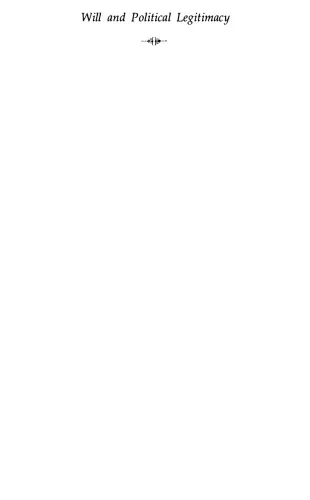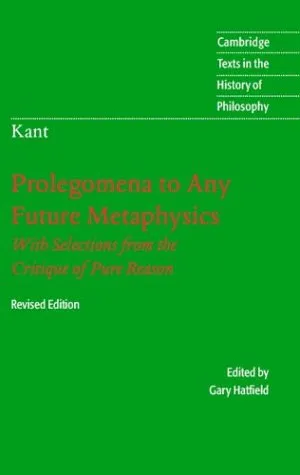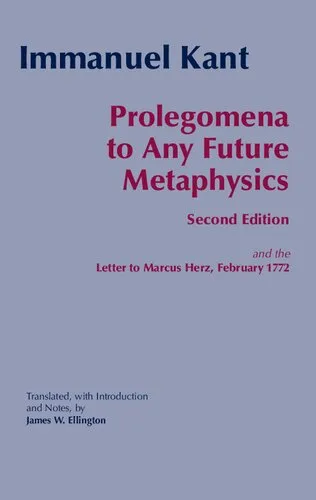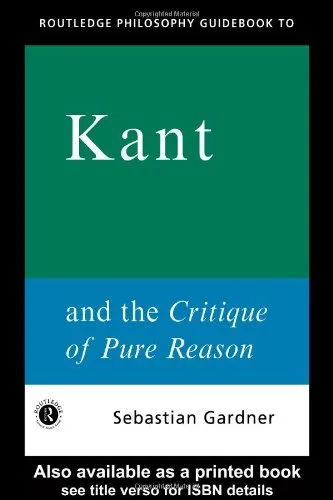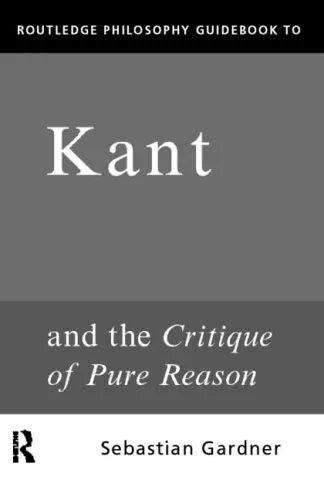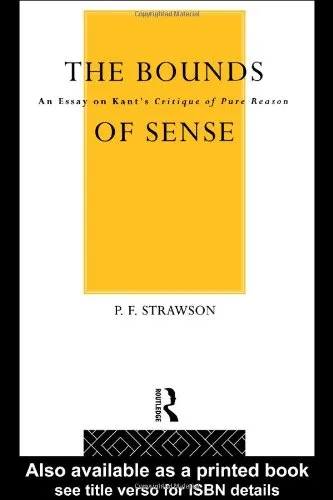Will and Political Legitimacy: A Critical Exposition of Social Contract Theory in Hobbes, Locke, Rousseau, Kant and Hegel
4.5
بر اساس نظر کاربران

شما میتونید سوالاتتون در باره کتاب رو از هوش مصنوعیش بعد از ورود بپرسید
هر دانلود یا پرسش از هوش مصنوعی 2 امتیاز لازم دارد، برای بدست آوردن امتیاز رایگان، به صفحه ی راهنمای امتیازات سر بزنید و یک سری کار ارزشمند انجام بدینکتاب های مرتبط:
معرفی کتاب: اراده و مشروعیت سیاسی
کتاب Will and Political Legitimacy: A Critical Exposition of Social Contract Theory in Hobbes, Locke, Rousseau, Kant and Hegel یکی از پژوهشهای کلیدی در زمینه فلسفه سیاسی است که به تحلیل نقادانه نظریه Contract اجتماعی در آرای فیلسوفانی همچون هابز، لاک، روسو، کانت و هگل میپردازد. این کتاب به بررسی دقیق مفهوم مشروعیت سیاسی از طریق اراده انسانی و توافقات اجتماعی پرداخته و تناقضات درونی و نوآوریهای کلیدی هر نظریه را تحلیل میکند.
خلاصه کتاب
این کتاب از چندین فصل تشکیل شده است که هر یک به تفصیل به یک فیلسوف و دیدگاه او درباره Contract اجتماعی میپردازد. نویسنده با نگاهی تطبیقی، دیدگاههای این فیلسوفان را بررسی کرده و نقاط قوت و ضعف آنها را به دقت ارزیابی میکند. برای توماس هابز، Contract اجتماعی ابزاری است برای پایان دادن به وضعیت طبیعی و ایجاد نظم اجتماعی مبتنی بر Leviathan. جان لاک، برخلاف هابز، بر حقوق طبیعی تاکید دارد و پروژه Contract را در راستای حفظ آزادی و مالکیت فردی پیگیری میکند. ژان-ژاک روسو با ارائه ایده "اراده عمومی" تحول بنیادینی در نظریه Contract اجتماعی ایجاد میکند، در حالی که کانت و هگل هر یک تلاش دارند تا بُعد اخلاقی و فلسفی تازهای به نظریههای پیشینیان بیافزایند.
این اثر به پژوهشگران نشان میدهد که چگونه نظریههای متفاوت درباره اراده، آزادی و مشروعیت سیاسی در گذر زمان شکل گرفتهاند و هنوز هم بر بحثهای مدرن تاثیرگذار هستند. از روحیات جهانبینی هابزی گرفته تا ایدهآلیسم تاریخی هگل، این کتاب سفری فکری در میان اندیشههای بنیادین نظریه سیاسی را ارائه میدهد.
نکات کلیدی
- بررسی فلسفه سیاسی از منظر اراده و مشروعیت.
- تحلیل انتقادی نظریههای هابز، لاک، روسو، کانت و هگل.
- توضیح نقش Contract اجتماعی در گذار از وضعیت طبیعی به دنیای مدنی.
- شناخت تناقضات درونی و ابهامات نظریهها.
- ارائه رویکرد تطبیقی بین نظریههای گوناگون برای فهم ارتباط آنها.
جملات معروف از کتاب
"To Hobbes, the social contract is the surrender of individual liberty to secure collective peace. To Locke, it's the guarantor of natural rights."
"The 'general will' in Rousseau does not simply refer to a collection of private interests, but a higher moral commitment to the collective."
چرا این کتاب اهمیت دارد؟
کتاب Will and Political Legitimacy نشاندهنده اهمیت نظریه قانون و Contract اجتماعی برای فهم بنیادهای سیاسی جهان مدرن است. این کتاب ابزار کاملی است برای دانشجویان، پژوهشگران و فیلسوفانی که علاقه دارند عمیقتر به رابطه میان اقتدار سیاسی، آزادی فردی و اراده جمعی بپردازند. نظریههای مطرحشده در این کتاب نه تنها تاریخی هستند، بلکه همچنان در سیاست معاصر کاربرد داشته و راهنمایی برای مواجهه با مسائل کنونی مانند مشروعیت دموکراسی، حاکمیت قانون و حقوق بشر ارائه میدهند.
با خواندن این کتاب، میتوان به درکی جامع از تحول تفکرات سیاسی دست یافت و از طریق تحلیل تطبیقی، دیدگاههای نوینی درباره رابطه میان انسان، جامعه و دولت به دست آورد.
Introduction to "Will and Political Legitimacy"
"Will and Political Legitimacy: A Critical Exposition of Social Contract Theory in Hobbes, Locke, Rousseau, Kant and Hegel" is a definitive exploration into the evolution of social contract theory as developed by some of the most influential political philosophers in history. This book approaches the subject with a rigorous yet accessible analysis, unveiling the complex interplay between individual will and the legitimacy of political authority. Authored with a scholarly yet engaging style, this work meticulously traces the development, divergence, and convergence of ideas among Hobbes, Locke, Rousseau, Kant, and Hegel, providing readers with a nuanced understanding of how the philosophical concept of social contracts has shaped both historical and contemporary political thought.
The book embarks on a journey through time, beginning with Thomas Hobbes’ vision of the social contract as a remedy to the chaos of the state of nature. It then moves through John Locke’s emphasis on natural rights and limited government, Jean-Jacques Rousseau’s concept of the general will, Immanuel Kant’s focus on autonomous moral will, and finally, G.W.F. Hegel’s synthesis of individual and collective will within the framework of ethical life. This critical exposition not only highlights the significant contributions of these thinkers but also critically examines their limitations and the implications of their theories for understanding political legitimacy in the modern world.
Whether you are a scholar, student, or curious reader with an interest in political philosophy, this book serves as a crucial resource that illuminates the enduring relevance of social contract theory in addressing fundamental questions about power, freedom, justice, and governance.
Summary of the Book
The book is divided into thematic sections that analyze and compare the distinct social contract theories proposed by Hobbes, Locke, Rousseau, Kant, and Hegel. Each section delves into how these philosophers conceptualized the relationship between individual will and the authority of the state, and how their ideas respond to the political realities of their respective historical contexts.
Hobbes argues for an absolute sovereign as the guarantor of peace and security, perceiving human nature as inherently self-interested and conflict-prone. Locke counters this with a vision of government as a protector of natural rights, envisioning the social contract as a voluntary agreement to secure life, liberty, and property. Rousseau innovates further by introducing the transformative concept of the "general will" as the foundation of political legitimacy, emphasizing collective decision-making and civic virtue.
The book then examines Kant’s deontological framework, where moral autonomy and categorical imperatives intersect with political authority to create a system rooted in rational freedom. Finally, Hegel’s dialectical method is explored, with his interpretation of the state as the embodiment of ethical life harmonizing individual freedom with communal obligations. Through these analyses, the book seeks to uncover the profound connections and disjunctions among these seminal thinkers, offering readers a comprehensive understanding of the evolution of political philosophy.
Key Takeaways
- An in-depth understanding of how social contract theory conceptualizes political legitimacy.
- Comparative insights into the ideas of Hobbes, Locke, Rousseau, Kant, and Hegel.
- Exploration of core philosophical concepts such as the state of nature, natural rights, the general will, moral autonomy, and ethical life.
- Critical examination of the challenges and limitations of social contract theories in contemporary political contexts.
- A structured framework for engaging with fundamental questions about power, authority, and freedom.
Famous Quotes from the Book
"Political legitimacy emerges not from coercion but from the alignment of individual will with collective moral reason."
"The history of social contract theory is the history of humankind’s pursuit to reconcile freedom with authority."
Why This Book Matters
"Will and Political Legitimacy" is not just a historical survey of social contract theories; it is a critical lens through which we can better understand contemporary debates about democracy, governance, and individual rights. In an era marked by widespread political disillusionment and the resurgence of authoritarianism, the questions raised by Hobbes, Locke, Rousseau, Kant, and Hegel remain deeply relevant. By critically engaging with these thinkers, this book equips readers with the intellectual tools to grapple with the dilemmas facing modern societies, including issues of inequality, social justice, and the tension between individual freedom and collective responsibility.
The book’s focus on the philosophical underpinnings of political legitimacy offers valuable insights not only to academics but also to policymakers, activists, and citizens who seek to understand the ethical basis of governance. At a time when the relationship between power and moral authority is increasingly contested, this book serves as a clarion call to revisit the wisdom of the great social contract theorists and their enduring contributions to political thought.
دانلود رایگان مستقیم
شما میتونید سوالاتتون در باره کتاب رو از هوش مصنوعیش بعد از ورود بپرسید
دسترسی به کتابها از طریق پلتفرمهای قانونی و کتابخانههای عمومی نه تنها از حقوق نویسندگان و ناشران حمایت میکند، بلکه به پایداری فرهنگ کتابخوانی نیز کمک میرساند. پیش از دانلود، لحظهای به بررسی این گزینهها فکر کنید.
این کتاب رو در پلتفرم های دیگه ببینید
WorldCat به شما کمک میکنه تا کتاب ها رو در کتابخانه های سراسر دنیا پیدا کنید
امتیازها، نظرات تخصصی و صحبت ها درباره کتاب را در Goodreads ببینید
کتابهای کمیاب یا دست دوم را در AbeBooks پیدا کنید و بخرید
1462
بازدید4.5
امتیاز0
نظر98%
رضایتنظرات:
4.5
بر اساس 0 نظر کاربران
Questions & Answers
Ask questions about this book or help others by answering
No questions yet. Be the first to ask!
